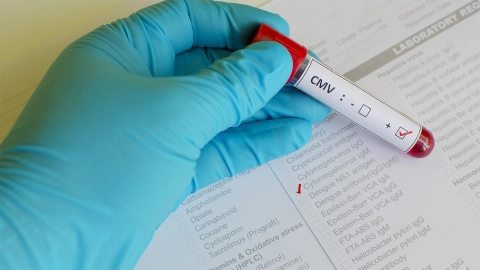Conditions Glandular fever
ICD codes: B27.0 What are ICD codes?
Glandular fever is a contagious infection. It is triggered by the Epstein-Barr virus (EBV). This virus belongs to the family of herpes viruses. Almost all people are carriers of EBV. Most people become infected as young adults. The virus is generally harmless for people with a healthy immune system.
At a glance
- Glandular fever is a contagious viral infection.
- It is triggered by certain herpes viruses, specifically the Epstein-Barr virus (EBV).
- EBV is usually transmitted through contact with saliva, for example, during kissing.
- Typical signs of the illness are swollen lymph nodes, a high temperature and an inflamed throat.
- For people with a healthy immune system, the infection is usually harmless and normally clears up without any after-effects. However, it can sometimes cause persistent fatigue.
- Infection with EBV can be dangerous for people with a significantly compromised immune system. For this reason, these individuals should avoid close contact with people who have the infection.
Note: The information in this article cannot and should not replace a medical consultation and must not be used for self-diagnosis or treatment.

What is glandular fever?
Glandular fever or infectious mononucleosis – often referred to simply as mononucleosis or “mono” for short – is an infectious disease caused by a virus. It is triggered by an infection with the Epstein-Barr virus (EBV), a sub-group of the herpes family of viruses.
In most cases, the virus is spread by means of contact with saliva, usually during kissing. Most people become infected as adolescents or young adults. Glandular fever is commonly known as the “kissing disease”.
The infection is mild for many people. As a rule, the virus clears up by itself within 2 to 4 weeks without any after-effects.
However, glandular fever can be dangerous for people with a significantly compromised immune system – for example, due to a HIV infection or following an organ transplant. For this reason, these individuals should avoid contact with people who have the infection.
Following an infection with EBV, people have life-long immunity against re-infection. However, after the initial infection, the virus remains “dormant” in the body and may become re-activated if the immune system is weakened.
If the virus is re-activated in an otherwise healthy person, the infection usually causes no symptoms because the body’s immune system has already developed the ability to fight it. In this case, the person may unknowingly pass on the virus to other people.
Video What are infectious diseases?
The video below looks at when doctors talk about an infectious disease, which pathogens trigger infectious diseases, and how they are transmitted.
This and other videos can also be found on YouTube
Watch nowThe privacy policy indicated there applies.
What are the symptoms of glandular fever?
Not every infection with the Epstein-Barr virus (EBV), which triggers glandular fever, produces symptoms.
People with an infection often have a sore throat and inflamed tonsils. They often also experience general symptoms such as a high temperature, headache, a feeling of being unwell and fatigue.
In addition, the lymph nodes on both sides of the neck are typically swollen and the spleen enlarged. Other lymph nodes may also be swollen.
If children under the age of 10 contract EBV, the infection is usually much milder than in adolescents. They normally don’t display any of the typical symptoms, and so the infection often goes unnoticed. Small children usually have no symptoms.
Symptoms such as fatigue, fever, throat infection and lymph node swelling may last for longer than 6 months in some cases. However, this chronic form of the disease is very rare.
What causes glandular fever?
Glandular fever is triggered by an infection with the Epstein-Barr virus (EBV). This virus belongs to the family of herpes viruses.
The virus begins by attacking the cells of the mucous membranes in the nose and throat, and multiplies there in great numbers. Later, it spreads to the white blood cells, which are important cells of the immune system. These travel, via the bloodstream and lymphatic system, to the lymph nodes and, later, to other organs like the spleen and liver, which may become swollen.
The virus is mostly spread by contact with saliva – often during kissing with a partner. If small children become infected, this is usually from kissing their parents. EBV can also spread by sharing drinking vessels or cutlery when eating.
In very rare cases, the virus can be transmitted to an unborn baby in the womb through the placenta.
How common is glandular fever?
Over 90 percent of people worldwide are carriers of the Epstein-Barr virus (EBV). However, not everyone who is infected with EBV will develop glandular fever.
Glandular fever commonly occurs in young people between the ages of 15 and 24. Experts estimate that almost all people become infected with EBV and develop immunity against it by the age of 30. For this reason, older adults usually have no symptoms if they come into contact with EBV.
What is the outlook for glandular fever?
For most people who contract glandular fever, their symptoms resolve within a few weeks and they make a full recovery. However, some people have symptoms, such as tiredness and fatigue, lasting for several months after the infection has cleared up. Complications can also occur.
Possible complications
Some people with glandular fever also develop a secondary bacterial infection.
As the Epstein-Barr virus (which triggers glandular fever) attacks the spleen, people often develop a swollen spleen. With severe swelling of the spleen, there is a risk that it may rupture. A ruptured spleen is a very rare but life-threatening complication that requires urgent medical treatment.
To minimize the risk of a ruptured spleen, it’s important to take a break from physical activities and sports until the enlarged spleen has completely healed and returned to its normal size.
Inflammation of the throat and tonsils can also cause swelling that impairs breathing. This occurs primarily in children but is rare. It also requires urgent treatment.
Other possible but rare complications are:
- meningitis
- myocarditis (inflammation of the heart muscle)
- kidney inflammation
- hepatitis (inflammation of the liver)
In people who have an immune system disorder or a significantly weakened immune system – for example, because they take medication that suppresses their immune system – severe swelling of the lymph nodes may occur.
An infection with EBV can also contribute to the occurrence of certain types of cancer, such as Hodgkin’s lymphoma. This is also more likely to occur in individuals with a severely compromised immune system.
How can glandular fever be prevented?
There is no vaccine to protect against glandular fever. However, certain hygiene measures can help people to avoid an infection with the Epstein-Barr virus (EBV).
For example, direct contact with infected individuals should be avoided. As EBV is spread via saliva, it is advisable to avoid sharing cutlery when eating, avoid sharing drinks and avoid kissing other people during an infection.
How is glandular fever diagnosed?
Glandular fever is indicated by symptoms such as fever, swelling in the neck and a sore throat – especially in young adults.
A doctor can determine whether the lymph nodes are swollen and whether the spleen or liver are enlarged.
If changes in the spleen or liver are suspected, a more precise diagnosis can be made on the basis of an ultrasound scan.
For a reliable diagnosis, the pathogen must be detected in a lab, and so the doctor will take a blood sample for testing. If antibodies against the Epstein-Barr virus (EBV) are found in the blood, this indicates an infection with EBV and glandular fever.
Changes in the blood count – in particular, the number and appearance of the white blood cells – also confirm this diagnosis.
How is glandular fever treated?
There is no specific treatment for glandular fever. Instead, the treatment focuses on relieving symptoms.
As with other viral infections, bed rest and adequate fluid intake support recovery.
Anti-inflammatory drugs such as ibuprofen and diclofenac help relieve fever and pain.
If breathing difficulties occur due to swelling in the throat, drugs to reduce swelling (such as cortisone) may be used.
If there is a secondary bacterial infection, this can be treated with antibiotics, which are effective against bacteria. However, certain antibiotics can cause a rash in people with an EBV infection and therefore cannot be used.
Important: To prevent complications such as a ruptured spleen, it’s important to avoid physical activity and sports for 4 to 6 weeks. A long recovery period is advisable, in particular for people who play competitive, high-performance sports.
It’s best to consult a doctor as regards when physical activities and sports can safely be resumed.
- HNO-Ärzte im Netz. Pfeiffersches Drüsenfieber – Definition und Häufigkeit. Aufgerufen am 17.12.2024.
- Krebsinformationsdienst, Krebsvorbeugung – Viren und weitere Krankheitserreger als Krebsauslöser. Aufgerufen am 06.01.2025.
- Hoover K, Higginbotham K. Epstein Barr Virus. [Updated 2021 Aug 11]. In: StatPearls [Internet]. Treasure Island (FL): StatPearls Publishing. Aufgerufen am 17.12.2024.
- Mohseni M, Boniface MP, Graham C. Mononucleosis. [Updated 2021 Aug 11]. In: StatPearls [Internet]. Treasure Island (FL): StatPearls Publishing. Aufgerufen am 17.12.2024.
- UpToDate [Internet]. Infectious Mononucleosis. Wolters Kluwer 2021. Aufgerufen am 17.12.2024.
Reviewed by the German Society for Pediatric Infectiology (Deutsche Gesellschaft für Pädiatrische Infektiologie e.V., DGPI).
As at:





